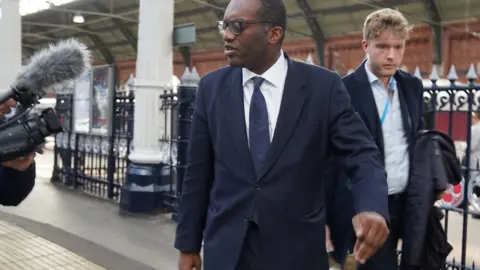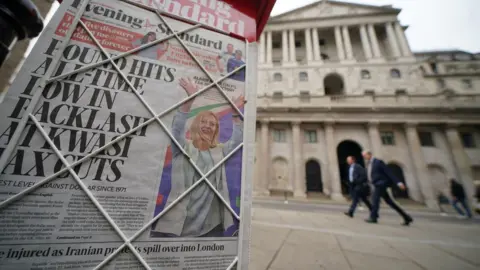Tax cuts are right plan for economy, says Liz Truss
Liz Truss has insisted tax cuts outlined in the mini-budget are the "right plan", despite market turmoil since they were announced last week.
The prime minister insisted "urgent action" had been required to grow the economy, and the cuts would help boost growth in the long term.
She added she was "prepared to do what it takes to make that happen".
Labour has said what it called a "kamikaze budget" should be reversed to restore market confidence.
But in her first public comments since the cuts to income tax were announced by the chancellor, Ms Truss said she was prepared to take "controversial and difficult decisions".
In a series of testy interviews with BBC local radio stations, she insisted that "currencies are under pressure around the world".
Later, during a series of TV interviews with the BBC's nations and regions' political editors, the prime minister was asked if she was saying: "Crisis, what crisis?"
"I'm not saying that at all," she replied. "I think we're in a very serious situation. It's a global crisis which has been brought about by the aftermath of Covid and Putin's war in Ukraine."
During a visit to a business in Darlington, Chancellor Kwasi Kwarteng - who has been widely criticised in recent days - underlined the prime minister's main message.
He said: "We are sticking to the growth plan and we are going to help people with energy bills. That's my two top priorities."
Kwarteng calls for MPs' backing
Asked if his mini-budget had been an economic disaster, he said growth was vital to "pay for the public services that we want to see", adding that the measures he had set out had been "absolutely essential in resetting the debate".
It has emerged that Mr Kwarteng has messaged Conservative MPs seeking to reassure them about his economic strategy and to ask for their support.
In a WhatsApp message seen by the BBC, he says the government is ''working at pace'' to show the markets there is a ''clear plan'' and says he has ''always valued colleagues' time and ideas".
 PA Media
PA MediaThe chancellor adds: "I understand your concern. We are one team and need to remain focused.
"The path we were on was unsustainable - we couldn't simply continue to raise taxes. However I totally understand the need to be credible with markets. We will show markets our plan is sound, credible and will work to drive growth."
Last week's £45bn tax-cutting package, funded by more public borrowing, has sparked a fall in the pound and a surge in borrowing costs.
The market reaction has prompted the Bank of England to step in and buy £65bn of government debt to stop some pension funds collapsing.
Asked about the reaction to the cuts, Ms Truss said the UK had the highest tax burden in 70 years and cuts were needed to stave off an economic slump.
And questioned about the fairness of the measures, which includes scrapping the 45p income tax band for top earners, the prime minister replied: "It's not fair to have a recession."
She added there was "plenty of evidence" that reducing the tax burden would boost economic growth.
The cost of public borrowing edged higher after the PM said she would stick with her plan, with the interest paid on 10-year government debt rising.
The pound continues to flutter around $1.08, a recovery on recent days but still weak.
Labour's shadow chancellor Rachel Reeves said the prime minister's interviews had made a "disastrous situation even worse".
She added: "Her failure to answer questions about what will happen with people's pensions and mortgages will leave families across the country facing huge worry.
"If the prime minister continues to prioritise saving her face over saving people's homes, Tory MPs must join Labour in calling for Parliament to be recalled so this kamikaze budget can be reversed."


Eight different interviews with eight different personalities within an hour - a punishing morning schedule for a prime minister who's so far been silent this week amid the fallout of her government's mini-Budget.
As presenter after presenter pressed her about the concerns of their listeners, Liz Truss tried to remain composed as she defended her economic approach but at times she lapsed into uncomfortable laughter and there were a number of awkward pauses.
She wanted to focus attention away from tax cuts and on to the energy bill support package - insisting growth would follow, albeit she admitted not overnight.
There was a difficult encounter over fracking with BBC Radio Lancashire, but the prime minister was mainly under pressure over the economy.
She had few words of reassurance for listeners with real worries now - instead her message was, it's necessary and the situation will be better for all in the long run.

 PA Media
PA MediaAfter a record fall in the value of the pound against the dollar earlier this week, the government announced it would set out a plan to cut debt in the "medium term" on 23 November.
In a bid to reassure markets, the Treasury has also asked government departments to find savings.
The Bank of England has announced it will buy £65bn in government debt to calm markets and stop certain types of pension funds collapsing.
It has also said it is prepared to hike interest rates to tame inflation, a move which would push up monthly mortgage payments for millions of homeowners.
Parliament remains suspended for the party conference season, with MPs not due to return until 11 October.
Downing Street has rejected opposition calls for next week's Conservative conference to be cancelled to allow an emergency recall.
BBC deputy political editor Vicki Young said plenty of Tory MPs were unhappy about the mini-budget, but several have told her they want to be constructive and are focusing on pressing for the Chancellor's November statement to be brought forward.
The economic backdrop is set to dominate the four-day party conference in Birmingham, Ms Truss's first since she took over as Tory leader earlier this month. The chancellor will address the event on Monday.
In Darlington, Mr Kwarteng said the government remained "absolutely committed" to maintaining the pensions triple lock.
It ensures that payments rise in line with September's headline rate of inflation, the growth in average earnings, or 2.5% - whichever is the highest.
But he said it would be "premature" to decide whether benefits would rise next April in line with the current inflation rate.
